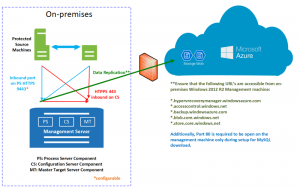Microsoft Azure Site Recovery supports SUSE Linux Enterprise Server
Microsoft Azure Site Recovery (ASR) now supports SUSE Linux Enterprise Server 11 SP3/SP4 and SUSE Linux Enterprise Server 12 SP1/SP2/SP3. This is great for customers that are planning to migrate systems to Microsoft Azure or customers who need to have a business continuity strategy for their Azure deployments.
Migration
Azure Site Recovery enables SUSE customers to migrate their non-Azure virtual machines or physical servers to Microsoft Azure virtual machines. ASR requires a Process Server, Configuration Server and the installation of the Mobility Service on each of the source machines. The Mobility Service captures all data writes from memory and will send them to the Management Server which will cache, compress and encrypt the data transmitted to Azure. The data is securely replicated and validated by the ASR services. Microsoft Azure Site Recovery supports many replication scenarios where the source system is not on Azure. To see the supported scenarios with documentation and tutorials, click on the link containing Microsoft Azure Site Recovery Scenarios. Below is an image from Microsoft’s Physical to Azure Architecture scenario.

Business Continuity
Another challenge customers face is how do they provide disaster recovery for workloads on Microsoft Azure. ASR has made it easy for SUSE virtual machines running in an Azure region to failover to a different Azure region for business continuity. Using Azure native services such as resource groups and storage accounts, ASR provides flexible failover plans and configurable RPOs. Additionally, ASR customers are able to use a cold site disaster recovery strategy to save money. In other words, the replication target is not a set of servers that are running and incurring charges for stand-by systems, it is a special storage account named a Recovery Services vault that contains copies of data and configuration information of the customer’s protected virtual machines. This means you only have to bring up the virtual machines for testing your disaster recovery plan or in the event of an actual disaster recovery.
Conclusion
As you read the post you might be asking yourself is this production ready and who is using it? Luckily, we have an answer. Daimler has entrusted its global procurement system to SUSE Enterprise Linux Server for SAP Applications clustering capability and Azure Site Recovery technologies to meet their business continuity SLAs. To read more about Daimler’s story click on the link: Daimler – Microsoft Customer Story.
If you are a SUSE customer and are interested on how you can benefit from Site Recovery reach out to your SUSE account team or email azure@suse.com!
Related Articles
Mar 05th, 2024
Connecting Industrial IoT devices at the Edge
Jan 08th, 2025
No comments yet